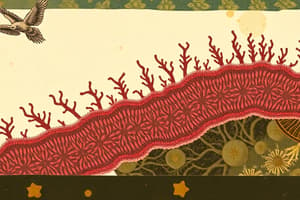Podcast
Questions and Answers
Which organelle is responsible for modifying newly synthesized proteins and lipids?
Which organelle is responsible for modifying newly synthesized proteins and lipids?
- Endoplasmic reticulum
- Lysosomes
- Mitochondria
- Golgi apparatus (correct)
What is the main function of primary producers in an ecosystem?
What is the main function of primary producers in an ecosystem?
- Breaking down waste products
- Producing oxygen through respiration
- Recycling nutrients from dead organisms
- Converting light energy into chemical energy through photosynthesis (correct)
Which process is responsible for the evolution of populations through changes in allele frequencies?
Which process is responsible for the evolution of populations through changes in allele frequencies?
- Gene flow
- Selection
- Drift (correct)
- Mutation
What provides mechanical strength to the cell and allows for intracellular movement?
What provides mechanical strength to the cell and allows for intracellular movement?
Which scientific discipline examines the relationships between organisms and their environment, focusing on topics like community structure and ecosystem function?
Which scientific discipline examines the relationships between organisms and their environment, focusing on topics like community structure and ecosystem function?
Which of the following best explains why human biology is more complex than that of simple, single-celled organisms?
Which of the following best explains why human biology is more complex than that of simple, single-celled organisms?
What is the main function of chloroplasts in plant cells?
What is the main function of chloroplasts in plant cells?
How do pharmacogenomic studies contribute to personalized medicine?
How do pharmacogenomic studies contribute to personalized medicine?
What is one significant difference between animal cells and plant cells?
What is one significant difference between animal cells and plant cells?
How does genetic variation among individuals impact human biology?
How does genetic variation among individuals impact human biology?
Flashcards are hidden until you start studying
Study Notes
Human Biology
Human biology is the branch of biology that focuses on understanding the anatomy, physiology, and development of humans. At the cellular level, human cells exhibit diverse structures and functions, ranging from simple, single-celled organisms like bacteria to complex multicellular systems like plants and animals. Humans share many cellular traits with other living beings, yet the complexity of human biology arises due to specialized cell types and highly organized tissues and organs.
The human genome contains over 3 billion base pairs, encoding thousands of genes responsible for various aspects of human biology, including growth, metabolism, and disease resistance. Genetic variation among individuals contributes to differences in physical appearance, cognitive abilities, and susceptibility to diseases.
Investigations into the genetic factors underlying human health and illness have led to significant advancements in personalized medicine and pharmacogenomics. Pharmacogenomic studies analyze individual responses to drugs, allowing doctors to tailor treatments specifically to a patient's genetic makeup.
Cell Biology
Cell biology is a fundamental aspect of biology, as it deals with the basic units of life: cells. Animal cells are characterized by their nucleus, containing chromosomes and DNA, whereas plant cells possess chloroplasts facilitating photosynthesis. Both animal and plant cells rely on mitochondria for energy production through cellular respiration.
The endomembrane system plays a vital role in cellular processes, including protein synthesis in the endoplasmic reticulum, vesicle transport, and secretion of proteins outside the cell. Additionally, the Golgi apparatus modifies newly synthesized proteins and lipids.
Organelles like lysosomes and peroxisomes have specific functions, such as breaking down waste products and producing hydrogen peroxide, respectively. The cytoskeleton provides mechanical strength to the cell and allows for intracellular movement.
Interactions between cells are mediated by various signaling pathways involving hormones, neurotransmitters, and growth factors. These interactions regulate cell division, differentiation, and apoptosis, ensuring proper tissue formation during embryonic development and maintaining homeostasis throughout an organism's lifespan.
Ecology
Ecology is the scientific discipline concerned with the relationships between and among organisms and their environment. It encompasses topics such as population dynamics, community structure, and ecosystem function. Ecology seeks to understand how living organisms interact with each other and with their abiotic environment, exploring patterns and processes at varying scales, from individuals to entire ecosystems.
A central concept in ecology is the balance between productivity and consumption within ecosystems. Primary producers, such as plants, convert light energy into chemical energy through photosynthesis, providing a food source for herbivorous consumers. Consumers in turn consume the primary producers, forming a complex web of interconnected trophic levels. Decomposers recycle nutrients from dead organisms, maintaining the cycling of elements necessary for life.
Ecosystem services refer to the benefits that humans derive from healthy ecosystems, such as clean air, water, and soil, as well as recreation and cultural values. Conservation biology aims to protect and restore habitats and populations to maintain these services over time.
Evolution
Evolution is the process by which populations of organisms evolve over generations through changes in allele frequencies due to mutation, gene flow, selection, and drift. Natural selection is the driving force behind evolution, favoring traits that increase the likelihood of survival and reproduction in a given environment.
Darwin's theory of natural selection explains how adaptation occurs through generations. Over time, organisms that possess advantageous traits are more likely to survive and reproduce, passing those traits onto their offspring. Eventually, these advantageous traits become dominant in the population, leading to adaptive radiation and the diversification of species.
Molecular biology has contributed significantly to our understanding of evolution, particularly through comparisons of DNA sequences across related species. By examining similarities and differences in genetic code, researchers can infer shared ancestry and trace the course of phylogeny. This information helps us better understand the relationships between species and the history of their evolution.
Studying That Suits You
Use AI to generate personalized quizzes and flashcards to suit your learning preferences.




